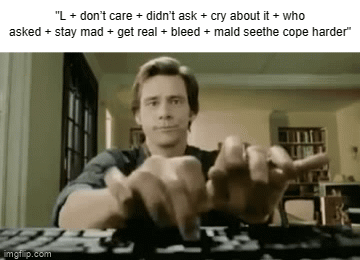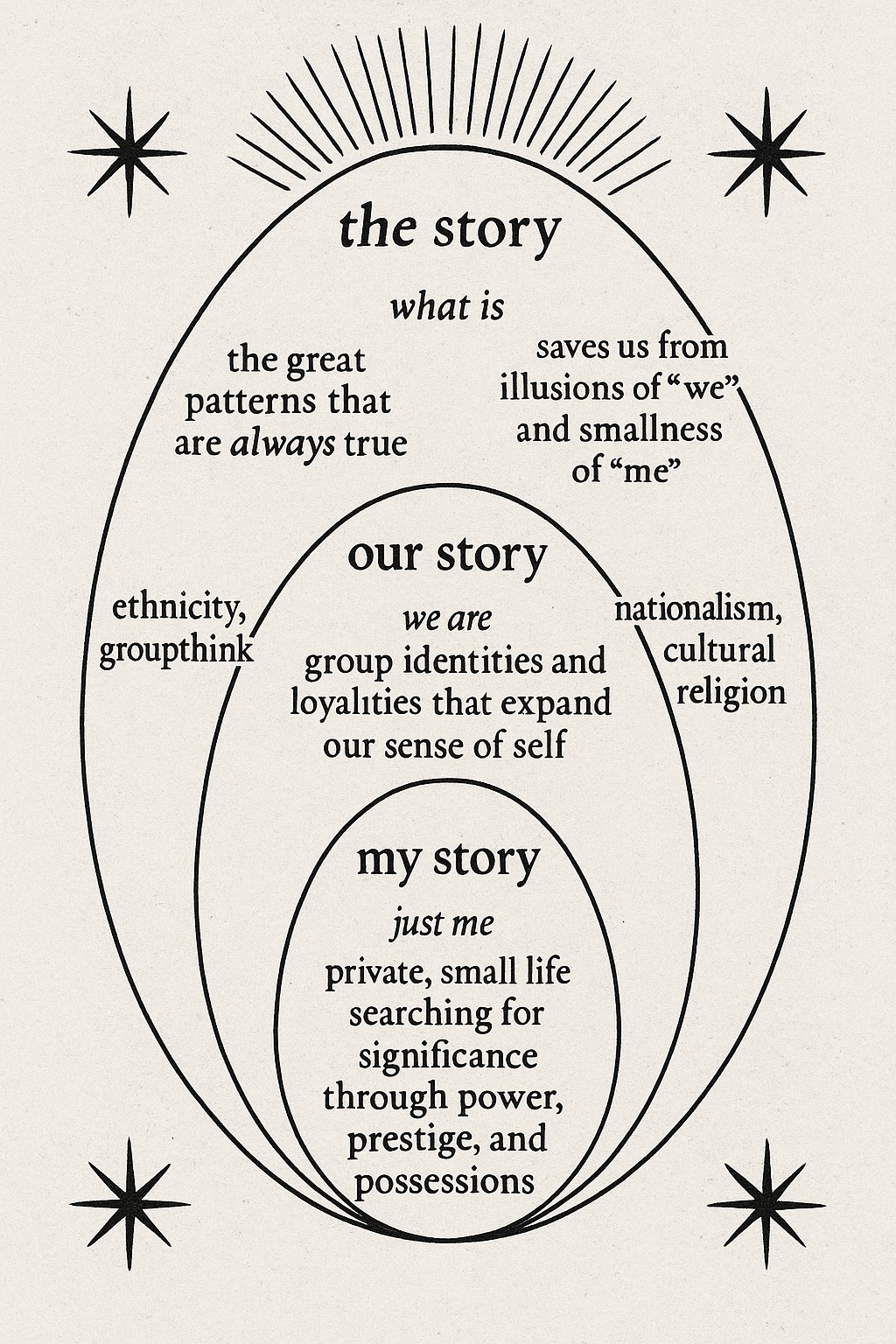Say It With Your Chest
How Weaponized Niceness Became the Internet’s Favorite Form of Control
The most effective form of control is the kind that calls itself kindness.
That’s the tone more and more people have learned to adopt on social media these days, especially when they want to correct, manage, or diminish someone without ever owning up to what they’re actually doing.
It arrives softly in sickly sweet disclaimers:
“Just reaching out with love.”
“Only sharing this because I care.”
“Not attacking…just wondering.”
But what it really does is monitor you. It pressures you to change, and if you don’t, you end up looking arrogant, unwell, or dangerous. Or worse, unworthy of their time, attention, or support.
As if the point of living is to make sure strangers on the internet still approve of your existence. As if you would bend your life, your process, or your voice just to stay aligned with their comfort. It’s absurd.
And yet, that’s the quiet demand embedded in these messages: edit yourself to stay palatable, or be cast as a problem to be handled.
Nothing says “fuck you” quite like “just checking in.”
Anyone who has created in public for more than five minutes knows this feeling. You can feel it when someone inserts themselves into your world — not to have a real conversation, but to put you back in line in a way that lets them feel stable while leaving you thrown off your axis.
This kind of person comes to you with concern, disappointment, and a careful arrangement of words they’ve convinced themselves is constructive dialogue, but is actually a form of control.
Once you’ve seen enough of these kinds of messages, the underlying message reveals itself pretty quickly: they want you on your knees. They want you to apologize for existing, speaking, or creating in a way that unsettles them.
I’ve watched this dynamic unfold for years. And not just in my own experience, but in the lives, inboxes, and comment sections of nearly every single creator I know. These people are some of the most integrity-driven, selfless, and self-reflective people I’ve ever met — and still, the messages pour in. A slow drip feed of veiled corrections disguised as kindness, filled with phrases like:
“I’ve always loved your work, but lately…”
“This is hard for me to say, but I couldn’t stay silent…”
These openers are typically followed by a list of grievances that have absolutely nothing to do with anything you’ve said or done, and everything to do with projection of their own inner turmoil.
I’ve realized that these kinds of comments aren’t meant to open any kind of meaningful conversation. What they’re actually meant to do is destabilize you, trigger toxic shame, and press on the softest points of your psychic skin while the sender maintains the façade of grace.
I used to torture myself and twist myself into pretzels wondering how to respond to stuff like this. I don’t waste my time with it anymore.
The deeper question all of this really evokes is: What do these people actually want?
I’ll tell you what they want.
Submission.
Access to your inner world without having to endure offering up their own.
The rush of correction without the responsibility of nuanced dialogue.
But most of all? They want the light in you to dim just enough to make them comfortable again. If you comply with their bizarre demands for correction and attention, they’ll call it “growth.” If you resist, they’ll call it narcissism. If you say nothing, they’ll write you off entirely. You’ve now become too big, too full of yourself, no longer worthy.
They think they’re chasing repair, but all they’re really wanting is relief. They want to feel right again. And the fastest way to do that is to make you feel wrong.
People don’t always want to be inspired. Sometimes they want to eat what unsettles them. Not to destroy it completely, but to possess it, bring it under their control, and reduce it to something they can easily metabolize without being changed by it.
Emotional Stunting as Strategy
This isn’t mental illness. It’s people refusing to grow the fuck up. These people cling to a version of themselves that keeps them in the center of every room. They walk around talking about “healing” while still acting like the most poisonous of high school bullies. Throwing fits, weaponizing therapy-speak, and expecting the world to cushion their immaturity while they punish anyone who dares to have boundaries.
And somehow, they’ve come to believe this is what it means to be sensitive — when in reality, it’s a pattern of unchecked entitlement, propped up by the refusal to build any internal structure of their own, paired with the expectation that everyone around them will reorganize themselves to avoid triggering them.
And if you don’t (God forbid), they come undone. And it’ll be public, loud, and in a way that always paints you as the one who’s hurt them. It’s a wild-as-hell, theatrical display of a nervous system stuck in adolescence, dragging everyone around it into a performance of repair completely detached from reality.
The psychiatric system rewards this. It gives people labels that sound like fate, as if your entire being is defective and there’s no way through it but maintenance. What a convenient story for everyone who stands to profit from your brokenness.
But it’s also a convenient story for the people who don’t want to take responsibility for the way they act. Because if it’s a disorder, then it’s not a choice. If it’s a disorder, then cruelty, volatility, and blame-shifting become traits, not behavior. And suddenly, anyone who reacts to their chaos becomes the real threat.
When you’ve been around enough people like this — people who drain your energy, twist your words, push your limits, then call you unsafe when you dare to name the reality of what’s happening — you stop wondering what to call it. There’s no point. You just know it when you feel it. And honestly? That’s enough.
These people aren’t disordered, they’re practiced. They’ve learned exactly how to pull power from guilt and how to keep themselves at the center while staying just loud enough to matter.
And if you don’t hand them all your energy? They’ll come for your reputation. It’s a kind of spiritual cannibalism. And it’s everywhere.
The Cost of Speaking from the Story
There is a very practical map that speaks to this entire dynamic. It was created by Richard Rohr, a Franciscan mystic and spiritual teacher who spent decades tracking the way people develop across spiritual, cultural, and psychological lines.
He named it “the Cosmic Egg.” I recreated the diagram and keep it close to where I work, because it’s one of the only things that helps me stay sane inside the psychic white noise of modern life.
At a glance, it can look a little intimidating. Let’s walk through it together.
At the base of the egg is my story. This is the realm of the personal ego, private obsession, and compulsive self-reference. Everything in this sphere becomes about significance. People stuck in this layer (and it’s honestly the vast majority of the population) seek control through image, status, and affirmation. Their actions are built entirely around what makes them feel safe, visible, and important. Most of the policing disguised as concern comes from this level. The language they use sounds generous and caring, but the engine humming underneath is deeply reactive, defensive, and self-protective. They need you to change so they can feel stable again.
The next layer is our story. Here we have the realm of collective identity. People in this layer build meaning through shared belief systems, affiliations, ideologies, and inherited roles. Here you’ll find group coherence. Groupthink. Cultural scripts. They use loyalty to the “in group” as proof of character or “goodness.” Many forms of community form in this space, but the structure depends entirely on mutual containment. If you dare to speak outside the agreed-upon code, you threaten the bond. You become the scapegoat. If you leave the circle, you are shunned. A traitor. They’ll call this belonging, but they’re really just protecting the safety of sameness.
Then we have the story. This is the field of pattern recognition and archetypal awareness. In this layer, you’ll find a rootedness beyond persona, brand, or tribal roles. Communication and relatedness from this place hold weight without needing to control. There is nothing to prove here or any kind of performance to uphold. Just what is. This kind of presence doesn’t rely on relatability, it doesn’t tone-shift to protect feelings, and it certainly doesn’t bend to avoid misinterpretation. It simply holds, sees, and names.
The sad reality is that most people have never experienced communication from this layer. So when they do happen to come into contact with it, they feel exposed. When people stuck in the my story and our story layers feel exposed, they frantically look for fault. They use all the tools they’ve been given — pathology, tone policing, spiritual gaslighting — to pull the speaker back into a frame they can manage and control.
They aren’t upset about what you said. They’re thrown off by how you said it. That kind of presence deeply upsets people who’ve built their entire identity around needing things to stay familiar. And when they don’t know how to deal with that feeling, they turn it into a moral problem and blame you for causing it.
When you speak from a place that doesn’t need approval, it rattles people who rely on validation to feel like they exist. They’ll call you dangerous, or full of yourself, or unstable — not because that’s true, but because it helps them feel less threatened.
These reactions aren’t reflections of who you are. They’re people trying to protect themselves from something they don’t know how to handle.
Say It With Your Chest
If you’ve been punished for being direct, clear, or emotionally self-contained, this one was for you. You aren’t cruel for refusing to contort yourself into someone else’s idea of what’s digestible or politically correct. You aren’t responsible for how other emotionally stunted internet strangers manage their discomfort. You’re not unsafe for having a spine. You’re just not easy to control.
So if you have something to say, say it with your chest. Don’t disguise it as concern, stretch it into a paragraph about care, and call it “feedback” when what you really want is compliance.
If someone bothers you, just say it.
If you think they’re wrong, just say it.
If you can’t stand them, just say it.
But stop pretending it’s a principled response to harm when it’s just your own discomfort begging for control.
And sure. Send your little message. Get it off your chest.
But don’t expect the person on the other end to give a singular fuck. They don’t know you. You’re a stranger on the internet typing at someone who’s never asked for your input.
I barely have time to shower alone these days, let alone sit down and dissect someone else’s worldview because it doesn’t match mine. I’m too busy raising a child, building something that matters, and trying to become more self-aware in my own life. And if you’re reading this, you’re probably wired the same way. You don’t have time for this kind of shit. You’re focused on your own work, your own growth, your own people.
So let’s be honest about what’s going on here. This isn’t edgy or noble or caring. It’s socially repugnant behavior that’s been allowed to pass as righteousness.
But the mask is slipping. And this kind of petty, performative policing is starting to rot in the open air. It’s not cute or clever anymore. And it’s becoming less and less socially acceptable by the day.
Bring back being a bitch. At least it’s honest.
So, say it with your whole fucking chest. Or don’t say it at all.
☿ ✶ 🜂 ✶ 🜁 ✶ 🜃 ✶ 🜄 ✶ ☿
Thanks for being here.
I hope reading this gave you a little catharsis. Because most of us are exhausted. The world is burning, the institutions are hollow, and everything real is under siege. And somehow people are still spending their short time on this planet playing digital hall monitor in the comments of strangers.
It’s deranged. And honestly? It should embarrass them.
One last thing. If you’re into this, you’ll very likely enjoy my podcast.
There are hundreds (yes, hundreds) of hours of episodes awaiting you. The pod is where we unravel toxic programming from dysfunctional family systems, societal scripts, and the mental health labels that have kept you small. We talk about sovereignty, shadow work, emotional alchemy, culture, AI, and everything that lives at the intersection of the soul and the system.
Back from the Borderline means back from the edge and the illusion that you’re too broken to heal. If that sounds like the kind of journey you’re ready to take, click here to follow the podcast on your favorite player. I drop new episodes every Tuesday.
Here’s a popular new episode I recommend starting with:
- Mollie
















Reading this was a mindfuck— a good one! Very convicting because tbh I see/find myself at both extremes of the dynamic simultaneously, but in a completely different and (unfortunately) power-dynamic-laden context 😓
I was also wondering about the diagram from ig, thanks for sharing more on that! It resonated. I went to my first “circling” session in Austin this week and the diagram maps very well to my experience of it, specifically to “my story” and to some extent “the story” (I think there was too much awareness in the room for much groupthink haha). But one thing that I wish could be worked into somehow is a notion of “your story” or “others’ story” at the innermost level as like a sibling to “my story.”
Communication is dizzying— It’s all such a game of telephone, even when played consciously / in integrity. Anyway if you haven’t heard of circling, Relateful is the place here, they have in person and online sessions. As a group practice it seems to aim at getting past all the individual stories to The Story, which seems very aligned with these themes
Been listening to & reading you for 2 years. So grateful I happened upon your work. Thank you for your offerings Mollie. You are a giant help to us all xx